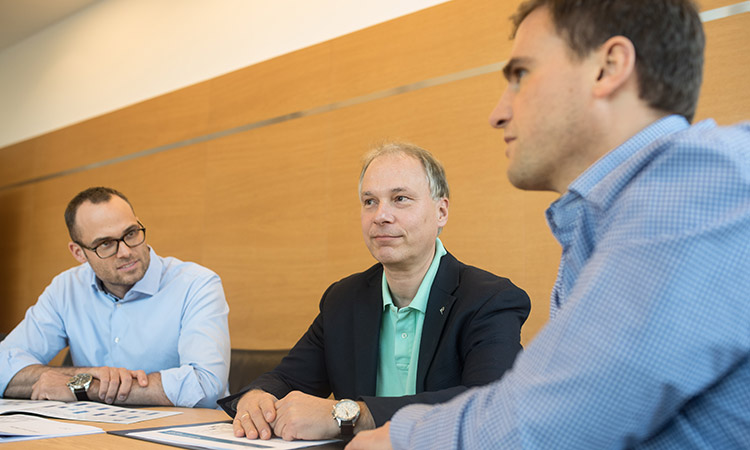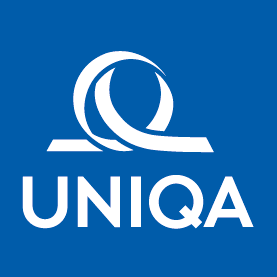Life insurance
A balancing act
Peter Eichler, the Management Board member responsible for personal insurance at UNIQA Austria and UNIQA International, speaks in an interview with Thomas Jaklin (Head of Life Insurance) and René Knapp (Head of Actuarial Mathematics and Risk Management) about how difficult it is in the current low-interest environment to offer endowment pension products. And explains why it was necessary to bring a new generation of products to the market.
You are responsible on the Management Board for personal insurance, including classic life insurance. How difficult are things right now?
Peter Eichler: The entire situation is a paradox. Interest guarantees are extremely expensive today – the key words are “Solvency II” and “increased equity capital requirement” – because of ongoing low interest rates, and therefore such guarantees are de facto not economically feasible. And yet these guarantees have been at the heart of every classic life insurance product for a long time. At the same time, the demand for pension insurance is greater than ever. It was clear to us as early as 2014 that classic life insurance as we have always known it was on its way out. This is why we’ve overhauled the product. Our new classic life insurance features a 100 per cent capital guarantee on paid-up net premiums, instead of actuarial interest in the classic sense. Also, the costs correlate with the percentage of profit and, with today’s earnings level, are significantly lower than in previous models. That is a real advantage for our customers. So we’ve found a balance between a good solution for our customers and a viable product for us. We’re very proud of that.
How will interest rates develop in future?
René Knapp: We are assuming that interest rates will remain at this low level over the next five years.
And how would you react if interest rates fell into the negative range over the long term?
Thomas Jaklin: Then classic life insurance as we know it today would no longer be feasible – nor would it make sense for our customers. No one wants to get a guarantee that they will receive noticeably less money in 30 years than they paid in. In this situation, regulators would have to intervene. We would have to readjust the asymmetrical distribution of profit and loss between the customer and the insurer. To do this, the legal framework would have to be significantly changed – for example with guaranteed buy-back values that could vary during the term to maturity.
Retirement savings have all but disappeared from the market. What would legislators have to change so that these products could be offered again?
Jaklin: Regulations for investment would have to be liberalised, above all the mandatory minimum percentage of investments to be held in equities would have to be dropped. It is technically difficult to structure, and from a risk and return perspective, it’s not useful either to customers or to us.
Is classic life insurance still profitable?
Eichler: From today’s perspective – yes, but only as long as the environment does not deteriorate further in a major way.
How high is the average guarantee commitment for all classic life insurances?
Knapp: Currently it stands just under 2.5 per cent.

René Knapp, Head of Group Actuarial Mathematics & Risk Management
Peter Eichler, Management Board member responsible for personal insurance
Thomas Jaklin, Head of Life Insurance
You have to make supplementary reserves to meet long-term liabilities for endowment life insurance. How high are these reserves right now?
Knapp: The supplementary reserves serve to strengthen our equity. We are ploughing money back now so that, if we need it, we can provide it to our customers to fulfil our guarantee commitments in a “worst case” scenario at some later point in time. So far, we have set aside provisions of about €100 million according to Austrian reporting regulations (the Austrian Commercial Code), and this amount will be tripled by 2020. The financing for building up this reserve is coming from our shareholders and customers, through a lower profit participation. At the present time we are not assuming that we will need this reserve, however. In other words, we are confident that this money will again benefit our shareholders and customers in the future.
Will you offer new retirement products in the coming year?
Eichler: We want to launch a newunit-linked life insurance in 2018. This product will be very attractive for our customers, above all due to its low cost. Customers who pursue a long-term savings goal and are prepared to accept some risk can spare themselves the 27.5 per cent capital gains tax that usually has to be paid for profits from funds or shares. This is because this tax does not apply in the insurance context.
Peter Eichler, 56
Peter Eichler has been the Management Board member responsible for Austrian personal insurance since 1999. In 2016, he also assumed responsibility for the personal insurance of the entire Group. Eichler studied law and commerce at the University of Vienna, completed the International Management programme in St. Gallen and started his career in 1988 at Austria Versicherung.
René Knapp, 35
René Knapp has been responsible for overall risk management functions at the UNIQA Group since early April 2015. His career at UNIQA began in 2007, directly after completing his degree in applied mathematics at the Technical University of Vienna. After working as an actuary and head of actuarial practice in life insurance for the Austrian companies of the UNIQA Group, in 2012 he was entrusted with the leadership of actuarial services for the entire UNIQA Group.
Thomas Jaklin, 39
Thomas Jaklin has been the head of underwriting for life insurance at UNIQA Austria since February 2012. Before assuming this post, he spent more than seven years gaining industry experience in actuarial mathematics. Jaklin has a degree in mathematics and has been responsible for the actuarial obligations of all UNIQA Group life insurance companies in Austria since April 2016.

